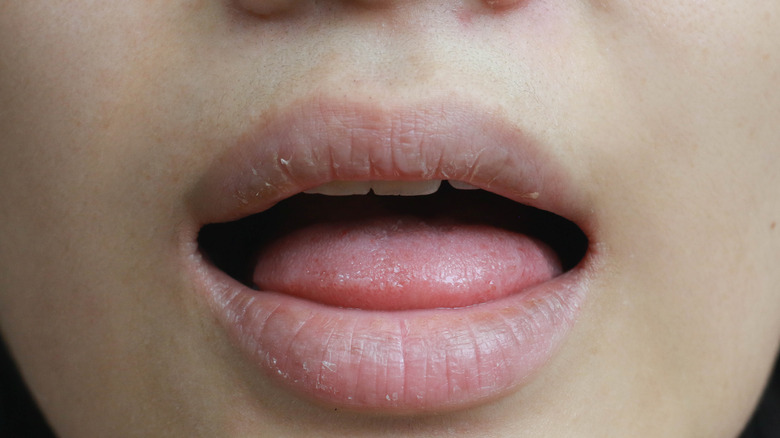What Risk Factors Can Lead To Dry Mouth?
Our mouth is meant to function as a moist environment. We have our saliva to thank for that. Produced by our salivary glands, spit helps break down food particles, cleanses our teeth of debris, protects against tooth decay, and facilitates swallowing, according to the National Institute of Dental and Craniofacial Research. In the midst of a stressful situation, however, you may have experienced the dry, sticky sensation that characterizes dry mouth. Also referred to as xerostomia, dry mouth occurs when our salivary glands fail to produce adequate amounts of saliva. As a result, swallowing, talking, or chewing can become challenging. We also become more susceptible to fungal infections and tooth decay, as one of the main roles of saliva is to wash away contaminants.
Many factors can increase our risk for dry mouth, among which include dehydration and mouth-breathing as you sleep (via Cleveland Clinic). Additionally, those with certain health conditions may also be at an increased risk for dry mouth, such as stroke, diabetes, Alzheimer's disease, and individuals undergoing radiation therapy for certain cancers. Autoimmune diseases, such as Sjogren's syndrome, which targets our moisture-producing glands, can also increase one's chances of dry mouth. Dry mouth has also been linked with hormonal changes in the body.
Treating dry mouth symptoms
Among the most common risk factors that can lead to dry mouth, however, is the taking of certain medications. In fact, The American Academy of Oral Medicine reports that more than 1,100 prescription and over-the-counter medications have been associated with dry mouth as a potential side effect. The risk increases for those taking two or more of these drugs. According to SingleCare, such medications include antihistamines, like Claritin or Allegra, certain blood pressure medications, decongestants, diuretics, stimulants, NSAIDs, as well as certain antipsychotic or antidepressant medications.
So how can we relieve dry mouth symptoms? Experts at SingleCare emphasize the importance of keeping yourself hydrated while minimizing intake of dehydrating beverages, such as coffee. Additionally, chewing on sugar-free gum can help prompt saliva production. For those susceptible to mouth-breathing, using a humidifier while you sleep can help preserve moisture in the air. While prescription treatment medications are also an option, supplements such as ginger and marshmallow root are purported to help boost saliva production as well. Lastly, saliva substitutes can be found at most drug stores. Coming in the form of liquids, sprays, mouthwashes, gels, toothpastes, and more, research published in the Journal of Pharmacy & BioAllied Sciences reports that artificial saliva contains wetting features designed to enhance speech function, eating, and preserve oral tissue health.


